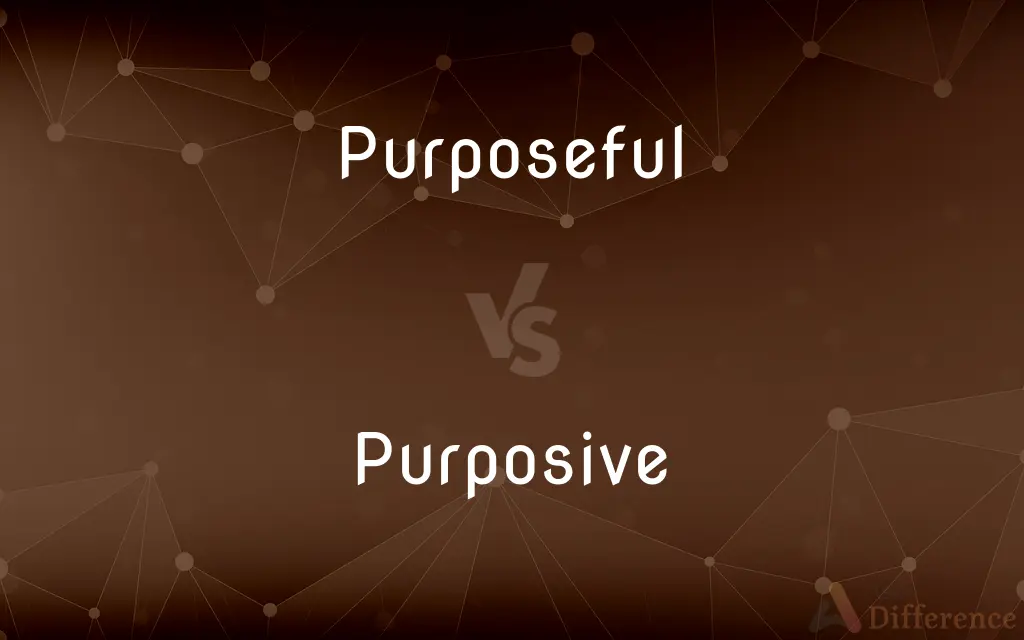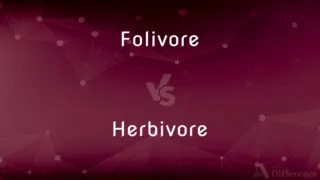Purposeful vs. Purposive — What's the Difference?
Edited by Tayyaba Rehman — By Maham Liaqat — Updated on March 10, 2024
Purposeful implies intention and resolve, while purposive suggests being designed for a specific purpose.

Difference Between Purposeful and Purposive
Table of Contents
ADVERTISEMENT
Key Differences
Purposeful describes actions, behavior, or attitudes characterized by a clear intention or determination. When someone is described as purposeful, it implies they have a specific goal in mind and are focused and resolute in achieving it. Purposive, on the other hand, is used to describe things or actions that are specifically designed or done with a particular purpose or goal in mind. It emphasizes the aspect of being created or undertaken for a specific, often practical, objective.
While both terms relate to having a purpose, purposeful often conveys a sense of determination and resolve in the manner of doing something. In contrast, purposive highlights the inherent design or intent behind an action, object, or process, focusing on the functionality or objective it serves.
A purposeful person is one who acts with determination and focus, driven by personal goals or motivations. Meanwhile, a purposive action, design, or method is one that is intentionally crafted or chosen to serve a specific end or function, often with a utilitarian aspect.
In summary, purposeful is more about the determined and intentional manner in which actions are carried out, embodying a sense of resolve, while purposive emphasizes the design or intention behind actions or objects, highlighting their functionality or objective-driven nature.
Comparison Chart
Definition
Having or showing determination or resolve.
Designed or done with a specific purpose in mind.
ADVERTISEMENT
Focus
On the manner or attitude of doing something.
On the design, intention, or functionality.
Connotation
Suggests determination and intentionality.
Implies practicality and goal-orientation.
Application
Often applies to people and their actions.
Typically relates to actions, methods, or designs.
Example
A purposeful approach to learning a new skill.
A purposive sampling method in research.
Compare with Definitions
Purposeful
Acting with a clear intention or goal.
Her purposeful approach to studying resulted in excellent grades.
Purposive
Created or done with a deliberate intention or purpose.
The purposive design of the building maximizes energy efficiency.
Purposeful
Designed or carried out with a specific aim in mind.
The company's purposeful marketing strategy targeted a younger audience.
Purposive
Characterized by having an intended goal or function.
The legislation was purposive in nature, aiming to address environmental concerns.
Purposeful
Demonstrating determination and focus.
He walked through the crowd with a purposeful stride.
Purposive
Relating to or serving a specific purpose, especially in a deliberate manner.
Purposive communication is key in effective teamwork.
Purposeful
Reflecting a strong sense of purpose or direction.
The leader's purposeful speech inspired the team.
Purposive
Involving actions or strategies that are goal-directed.
The campaign's purposive messaging was aimed at raising awareness about health issues.
Purposeful
Engaging in activities that are meaningful or goal-oriented.
She spends her time on purposeful activities that contribute to her personal growth.
Purposive
Employing a means specifically chosen to achieve an intended result.
The study used a purposive sampling technique to select participants.
Purposeful
Having a purpose; intentional
A purposeful musician.
Purposive
Having or serving a purpose.
Purposeful
Having or manifesting purpose; determined
Entered the room with a purposeful look.
Purposive
Purposeful
Purposive behavior.
Purposeful
Having purpose; intentional.
Purposive
Serving a particular purpose; adapted to a given purpose, especially through natural evolution.
Purposeful
Having a purpose in mind; resolute; determined.
Purposive
Done or performed with a conscious purpose or intent.
Purposeful
Important; material.
Purposive
(psychology) Pertaining to purpose, as reflected in behaviour or mental activity.
Purposeful
Serving as or indicating the existence of a purpose or goal
Purposive
Pertaining to or demonstrating purpose.
Purposeful
Having meaning through having an aim;
Led a happy purposeful life
Purposive
Possessed of a firm purpose.
Purposive
(grammar) Of a clause or conjunction: expressing purpose.
Purposive
Having or indicating purpose or design.
Purposive modification of structure in a bone.
It is impossible that the frog should perform actions morepurposive than these.
Purposive
Having or showing or acting with a purpose or design;
Purposive behavior
Purposive
Having a purpose;
Purposive behavior
Common Curiosities
Can a person be described as purposive?
While "purposive" is more commonly used to describe actions or strategies, it can also refer to a person's behavior when emphasizing their goal-oriented and intentional actions.
Is a purposeful action always purposive?
A purposeful action is often purposive in nature, but the terms emphasize different aspects; "purposeful" focuses on determination, while "purposive" highlights the goal-oriented design.
What does purposeful mean?
Purposeful describes actions or behavior characterized by determination and a clear intention, reflecting a strong sense of resolve.
What does purposive mean?
Purposive refers to things or actions that are designed or undertaken with a specific purpose in mind, emphasizing practicality and goal-orientation.
How do purposeful and purposive differ?
Purposeful focuses on the determined manner of doing something, while purposive highlights the design or intention behind actions or objects to serve a specific end.
What is an example of a purposive action?
A purposive action could be selecting a specific group for a study to ensure the results address the research question directly.
Is being purposeful a positive trait?
Being purposeful is generally viewed as positive, as it implies intentionality, focus, and determination in achieving goals.
Can an object be described as purposeful?
An object is more commonly described as purposive when focusing on its design or functionality for a specific goal, but it can be called purposeful if it embodies or symbolizes a sense of intention or resolve.
Can a plan be purposive?
Yes, a plan can be purposive if it is designed with specific objectives in mind and employs deliberate strategies to achieve those goals.
How does one adopt a purposeful attitude?
Adopting a purposeful attitude involves setting clear goals, maintaining focus, and approaching tasks with determination and resolve.
What makes an activity purposive?
An activity is purposive if it is deliberately designed or chosen to achieve a particular aim or serve a specific function.
How do companies use purposive strategies?
Companies use purposive strategies to achieve specific business objectives, such as targeting particular markets or addressing certain consumer needs.
What is the importance of purposive communication?
Purposive communication is crucial for clarity, efficiency, and effectiveness in conveying messages intended to achieve specific outcomes.
Can a purposeful decision be made without a specific goal?
A purposeful decision typically involves a specific goal, as the term implies intentionality and directedness toward an outcome.
How can one differentiate between a purposeful and a purposive approach in a project?
A purposeful approach in a project is characterized by determination and resolve in execution, while a purposive approach focuses on the strategic and intentional design of the project's components to achieve specific goals.
Share Your Discovery

Previous Comparison
Shot vs. Hit
Next Comparison
Folivore vs. HerbivoreAuthor Spotlight
Written by
Maham LiaqatEdited by
Tayyaba RehmanTayyaba Rehman is a distinguished writer, currently serving as a primary contributor to askdifference.com. As a researcher in semantics and etymology, Tayyaba's passion for the complexity of languages and their distinctions has found a perfect home on the platform. Tayyaba delves into the intricacies of language, distinguishing between commonly confused words and phrases, thereby providing clarity for readers worldwide.














































